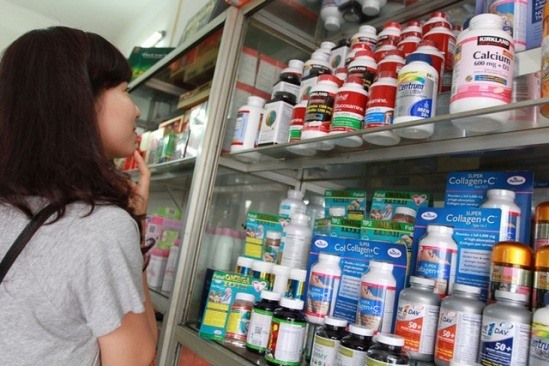 Society
Society

The Ministry of Health has urged relevant agencies to develop a Government decree on dietary supplements to control the production, trade, advertisement and labelling of the products.
 |
| The Ministry of Health has urged relevant agencies to develop a Government decree on dietary supplements to control the production, trade, advertisement and labelling of the products. — Photo phapluatxahoi |
HÀ NỘI — The Ministry of Health has urged relevant agencies to develop a Government decree on dietary supplements to control the production, trade, advertisement and labelling of the products.
According to the ministry, the dietary supplement industry is thriving in Việt Nam with an increase of businesses and products but the country has also seen a surge of fake or substandard dietary supplements.
Last year, inspectors from the Ministry of Health investigated 244 cases related to the trade and manufacture of unsafe dietary supplements and pharmaceutical products.
In 2015, police seized 20 tonnes of fake dietary supplements in Hà Nội and another 12 tonnes of dietary supplements of unknown origin in HCM City.
Most of the fake supplements allegedly came from China and had their packages, labels and origins changed before being sold in the domestic market.
The fake or unknown origin products were often sold at much higher prices than authentic ones.
In some cases, producers and importers overstated the effectiveness of the products or failed to meet requirements in production, particularly in hygiene.
Among 88 violators detected in the first 10 months of last year, 55 violated advertising regulations. The others were found to have skipped regular quality tests or inaccurately labelled the products.
As many as 18 businesses were suspended.
Chinhphu.vn has reported that about 63 per cent of adults in Hà Nội and 43 per cent in HCM City said that they used dietary supplements.
Ten years ago, there were 13 dietary supplement producers with 63 products in Việt Nam. In 2016, there were almost 4,000 producers and importers including 837 Vietnamese firms.
More than 20,000 made-in-Việt Nam dietary supplement products have been announced, making up 60-65 per cent of dietary supplements sold in Việt Nam.
Nguyễn Việt Cường, chief inspector of Hà Nội Health Department told Giao thông (Transport) newspaper that shortcomings remained in managing dietary supplements.
“Dietary supplements are not in the list of products that are required to publicise prices, resulting in their retail prices usually being much higher than imports,” Cường said.
Agencies found it difficult to oversee the prices of these products, particularly those related to pyramid selling.
Nguyễn Thu Hương, 30, of Hà Nội, said that she used dietary supplements like multi vitamins for her kids, Glucosamine for her parents or anti-aging products for her self.
“I usually buy the products from reliable sellers or my friends living overseas send them to me,” she said, adding that many times, she was shocked to see products and their prices offered for sale online. — VNS




